Coursera offers over 40 degree programs from top-tier universities, including the University of Illinois, Georgetown, and the University of Pittsburgh.
You’ll explore the complete degree catalog, compare programs across different levels and categories, analyze pricing structures, and help you determine if pursuing a degree through Coursera aligns with your career goals.
If you’re considering a bachelor’s, master’s, or postgraduate program, this article provides the factual information needed to make an informed decision about your educational investment.
Top 5 Coursera Degrees List
Here are the top 5 Coursera degrees that are explored and valued worldwide. Let’s take a brief overview:
| Rank | Degree Program | University | Level | Application Deadline | Key Highlight |
|---|---|---|---|---|---|
| 1 | Master of Computer Science in Data Science | University of Illinois Urbana-Champaign | Master’s | Rolling | #25 globally for computer science (QS Rankings) |
| 2 | Master of Data Science | University of Pittsburgh | Master’s | August 17, 2025 | Carnegie R1 research institution |
| 3 | Master of Business Administration (iMBA) | University of Illinois Urbana-Champaign | Master’s | June 4, 2025 | #12 in Top Public Universities (US News) |
| 4 | Bachelor of Arts in Liberal Studies | Georgetown University | Bachelor’s | June 14, 2025 | #24 in National University rankings |
| 5 | Master of Science in Data Analytics Engineering | Northeastern University | Master’s | July 24, 2025 | Top 40 Graduate Schools in Engineering |
Detailed Coursera Degree Program Breakdown
You’ll explore additional details on each of the five degrees mentioned above, including curriculum and career scope.
1. Master of Computer Science in Data Science
The University of Illinois Urbana-Champaign’s Master of Computer Science in Data Science leads our list due to its exceptional global ranking and curriculum, which covers machine learning, statistical analysis, and big data technologies.
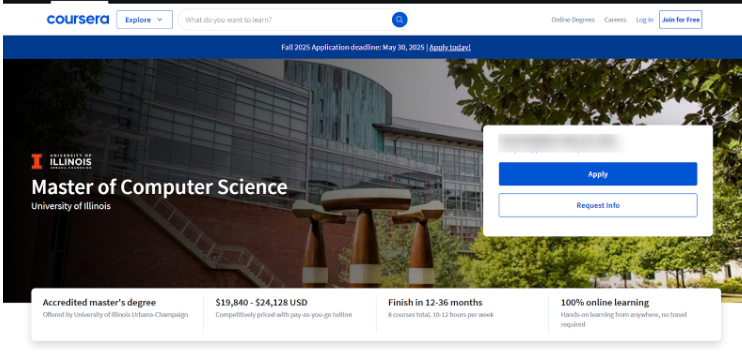
This program attracts working professionals seeking advanced technical skills without interrupting their careers.
2. Master of Data Science
University of Pittsburgh’s Master of Data Science offers rigorous training from a Carnegie R1 research institution, providing hands-on experience with real-world datasets and industry partnerships.
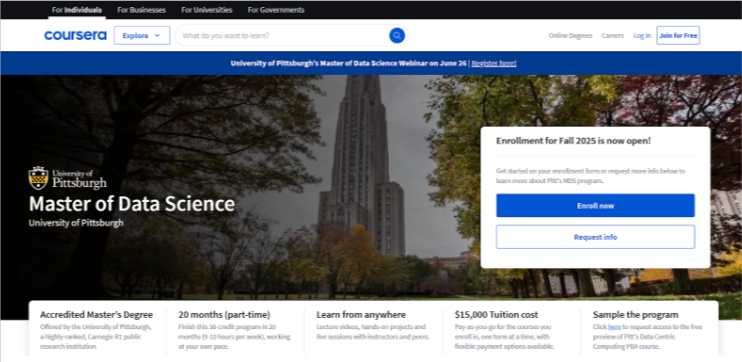
The program emphasizes the practical application of data science methodologies across various business contexts.
To learn more about how this compares to entry-level courses, you might find Best Coding Learning Platform helpful.
3. Master of Business Administration (iMBA)
The iMBA from the University of Illinois represents one of the most prestigious online MBA programs available, combining traditional business education with modern digital delivery.
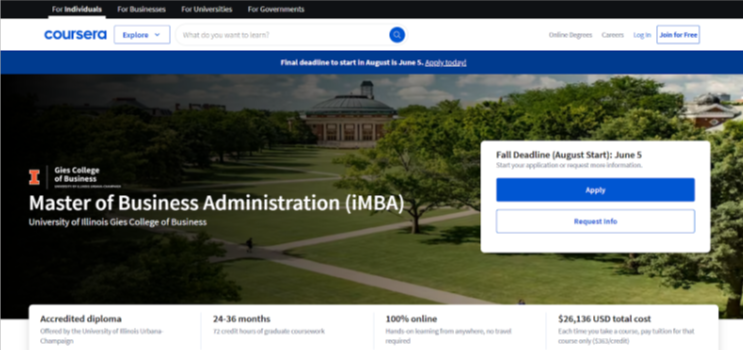
Students access the same faculty and curriculum as their on-campus counterparts while maintaining work-life balance.
For learners evaluating general vs. specialized courses, the Coursera vs Coursera Plus comparison might offer some clarity.
4. Bachelor of Arts in Liberal Studies
Georgetown University’s Bachelor of Arts in Liberal Studies offers a flexible undergraduate education from a top-ranked institution, ideal for working adults or those seeking a broad-based knowledge across multiple disciplines.
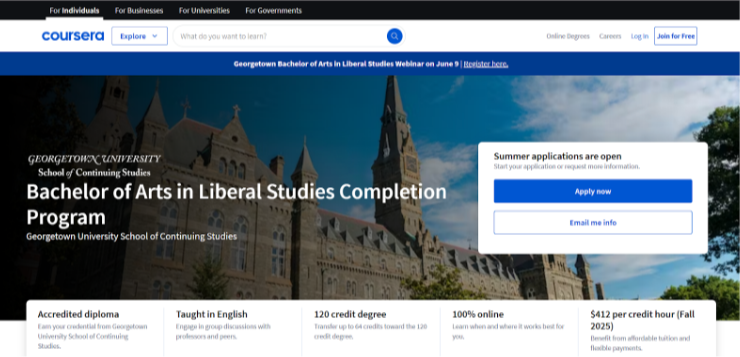
5. Master of Science in Data Analytics Engineering
Northeastern’s Data Analytics Engineering program bridges the gap between technical data skills and engineering principles, preparing graduates for emerging roles in designing data infrastructure and analytics systems.
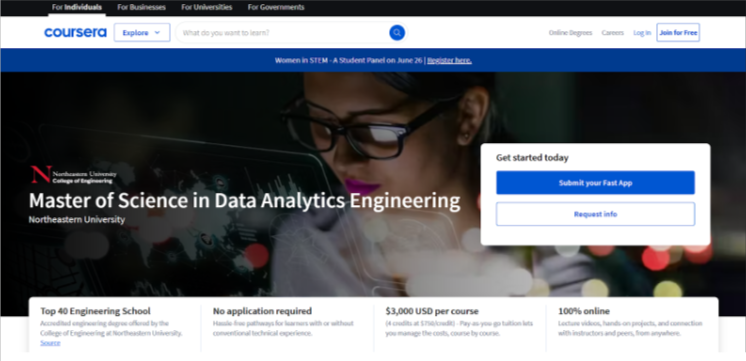
What Types Of Degrees Are On Coursera?
Coursera hosts degree programs from over 20 prestigious universities worldwide, providing students with unprecedented access to high-quality higher education, regardless of their geographic location or scheduling constraints. Let’s explore further:
1. By Program Level
The platform categorizes degree offerings into three distinct academic levels, each serving different educational and career advancement needs for diverse student populations.
| Type | Specifications | Price Range |
|---|---|---|
| Bachelor’s Degrees | 4-year undergraduate programs from accredited universities, flexible scheduling, same curriculum as on-campus | $15,000 – $25,000 total |
| Master’s Degrees | Graduate-level programs requiring a bachelor’s degree, specialization focus, 1.5-3 years of completion | $15,000 – $40,000 total |
| Postgraduate Programs | Advanced certificates and specialized programs, professional development focus, 6-12 month duration | $8,000 – $15,000 total |
These program levels cater to students at various career stages, from recent high school graduates to experienced professionals seeking advanced credentials for leadership roles.
If you’re unsure whether to invest in a full degree, consider trying a Coursera Free Trial first.
2. By Category
Coursera organizes degree programs across eight primary academic categories, reflecting current industry demands and global educational trends for maximum career relevance.
| Category | Specifications | Price Range |
|---|---|---|
| Business and MBA Degrees | Management, entrepreneurship, finance focus, leadership development, global perspective | $20,000 – $40,000 |
| Computer Science Degrees | Programming, software engineering, systems design, algorithm development, and emerging technologies | $15,000 – $35,000 |
| Data Science Degrees | Statistical analysis, machine learning, big data processing, predictive modeling, and visualization | $18,000 – $35,000 |
| Public Health Degrees | Epidemiology, health policy, community health, global health systems, research methodology | $16,000 – $30,000 |
| Data Analytics Degrees | Business intelligence, data mining, statistical computing, decision science, analytics tools | $15,000 – $32,000 |
| Top European Degrees | European university partnerships, international perspectives, diverse specializations, and cultural integration | $12,000 – $28,000 |
| Maestrías en línea de Latinoamérica | Spanish-language programs, Latin American focus, regional business practices, cultural context | $8,000 – $20,000 |
| Top Indian Degrees | Indian institution partnerships, technology focus, emerging market perspectives, and cost-effective options | $5,000 – $15,000 |
This categorical diversity ensures students can find programs aligned with their specific industry interests, geographic preferences, and cultural backgrounds while maintaining academic excellence.
For affordable options, don’t miss this- Coursera Black Friday deals.
Are Coursera Degrees Legitimate And Recognized?
Coursera degrees are entirely legitimate and widely recognized by employers, graduate schools, and professional organizations worldwide.
These programs undergo the same accreditation processes as traditional on-campus degrees, ensuring they meet rigorous academic standards. Major corporations, including Google, IBM, and Microsoft, actively recruit Coursera degree graduates, recognizing the quality and relevance of their education.

Graduate schools also accept these credentials for further study, with many students successfully transitioning to doctoral programs at prestigious institutions.
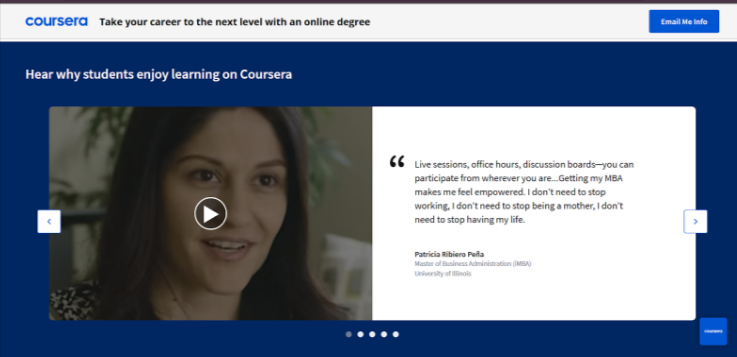
The key factor is not the delivery method but the accrediting university’s reputation and the program’s academic rigor, both of which remain identical to traditional offerings.
Coursera vs Traditional Degrees
Understanding the fundamental differences between Coursera and traditional degree programs helps prospective students make informed decisions based on their personal circumstances and career objectives.
| Parameter | Coursera Degrees | Traditional Degrees |
|---|---|---|
| Scheduling | Complete flexibility in scheduling | Fixed class schedules |
| Location | Study from anywhere globally | Campus attendance required |
| Cost | Significantly lower total costs | Higher tuition and fees |
| Learning Pace | Self-paced learning options | Instructor-paced curriculum |
| Target Audience | Working professional friendly | Full-time student focus |
| Networking | Digital networking opportunities | In-person campus networking |
| Examinations | Online proctored examinations | Traditional testing methods |
| Faculty Access | Virtual faculty interactions | Face-to-face professor access |
| Commuting | No commuting required | Travel to campus |
| Delivery Method | Technology-enhanced learning | Traditional classroom delivery |
| Lecture Access | Recorded lectures available | Live lectures only |
| Community | Global student community | Local student body |
Both pathways lead to identical degrees and career opportunities, with the choice depending primarily on individual learning preferences, lifestyle requirements, and financial considerations.
What Are The Pros and Cons Of Pursuing a Degree on Coursera?
Here are some pros and cons for you to decide which path is better for you
Pros
- Exceptional flexibility for working professionals
- Significantly lower costs than traditional programs
- Access to a top-tier university education
- Global networking with diverse students
- Self-paced learning accommodates busy schedules
Cons
- Limited face-to-face interaction opportunities
- Requires strong self-discipline and motivation
- Fewer campus-based extracurricular activities
- Technology dependency for all coursework
- Less traditional college social experience
Coursera Pricing For Degrees
Individual degree programs range from $5,000 for select international programs to $40,000 for premium MBA offerings from top-tier institutions.
Most master’s degree programs cost between $15,000 and $25,000 total, payable through flexible monthly installments ranging from $300 to $600 per month.
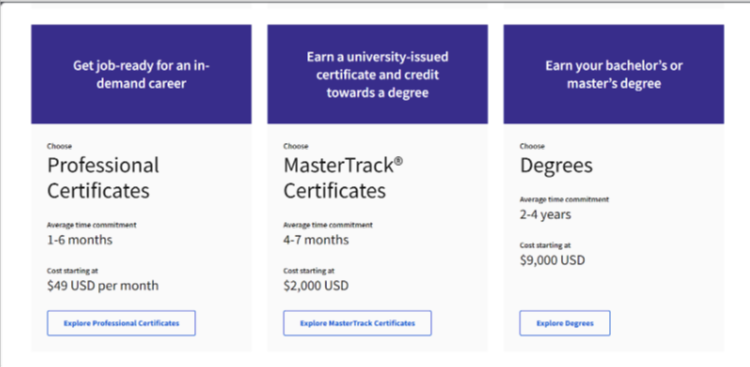
Coursera Plus subscriptions ($399 annually) provide access to individual courses and professional certificates but do not cover degree program tuition. Degree students pay university tuition directly, which includes access to all course materials, faculty support, academic advising, and technical infrastructure.
Many universities offer financial aid, scholarships, and employer tuition reimbursement programs to reduce overall costs. Payment plans allow students to spread costs over the program duration, with some universities offering income-driven repayment options.
Not ready to commit to a full degree just yet? Learn how to audit Coursera Courses for free.
Are Degrees Through Coursera Worth It?
Coursera degrees offer exceptional value for students seeking flexible and affordable access to high-quality university education.
Here’s why they provide an outstanding return on investment:
- Prestigious university credentials from top-tier global institutions
- Significantly lower costs than traditional on-campus programs
- Complete scheduling flexibility for working professionals
- Substantial career advancement reported by program graduates
- Employer recognition from major corporations worldwide
- Academic rigor is maintained through an identical university curriculum
- Global accessibility removes geographic education barriers
- Self-paced learning options accommodate different schedules
For students who thrive in self-directed learning environments and need educational flexibility, Coursera degrees offer an outstanding return on investment while maintaining institutional credibility.
Coursera Degree Alternatives
1. edX
offers university degree programs from institutions like MIT and Harvard, with a focus on technology and business programs that utilize similar online delivery methods and competitive pricing structures.
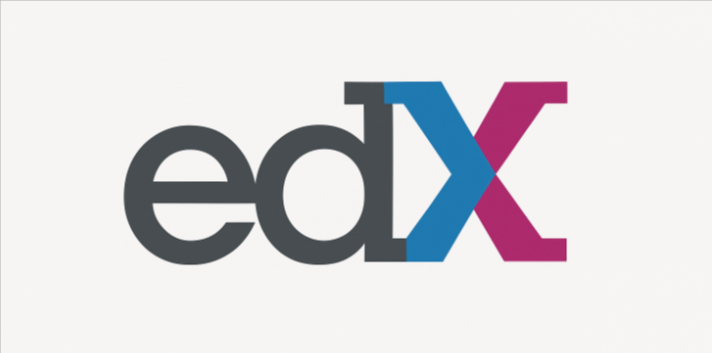
2. Udacity
Provides nanodegree programs and school-based learning paths, designed in partnership with major technology companies, that emphasize practical skills and industry-relevant projects.
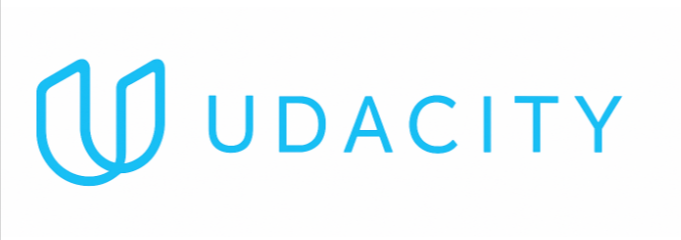
3. Arizona State University Online
Delivers fully accredited degree programs directly through their platform, offering traditional university experience adapted for online delivery with extensive student support services.
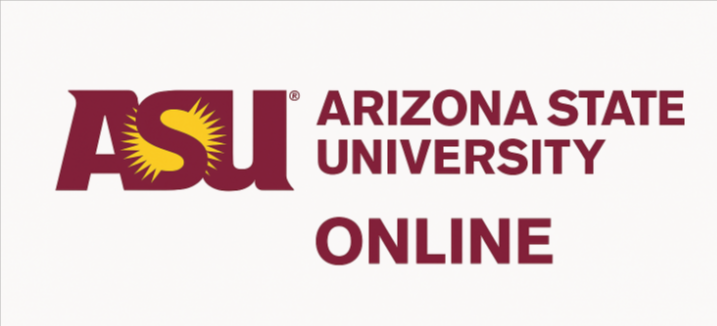
Conclusion- Coursera Degrees Are Accredited University Programs
Coursera offers over 40 fully accredited online degree programs from top universities like the University of Illinois, Georgetown, and the University of Pittsburgh.
Programs include bachelor’s, master’s, and postgraduate levels, covering fields like data science, business, and public health.
Costs range from $5,000 to $40,000, which is lower than the costs associated with traditional degrees.
These flexible programs maintain rigorous academic standards and are recognized by employers worldwide, making them a valuable, cost-effective option for career advancement.
Ready to transform your career with a Coursera degree? Explore available programs today and take the first step toward your educational goals.
FAQs
Since programs are entirely online, international students can earn degrees without requiring a student visa or relocating to the United States.
Enrolled students receive full university support, including academic advisors, career services, and technical assistance.
Most programs incorporate collaborative assignments, discussion forums, and virtual team projects to provide comprehensive learning experiences.
Graduates become full alumni with lifetime access to university networks, job boards, and career resources.
Students require reliable internet access, computer resources, and foundational digital literacy skills to succeed in online coursework.